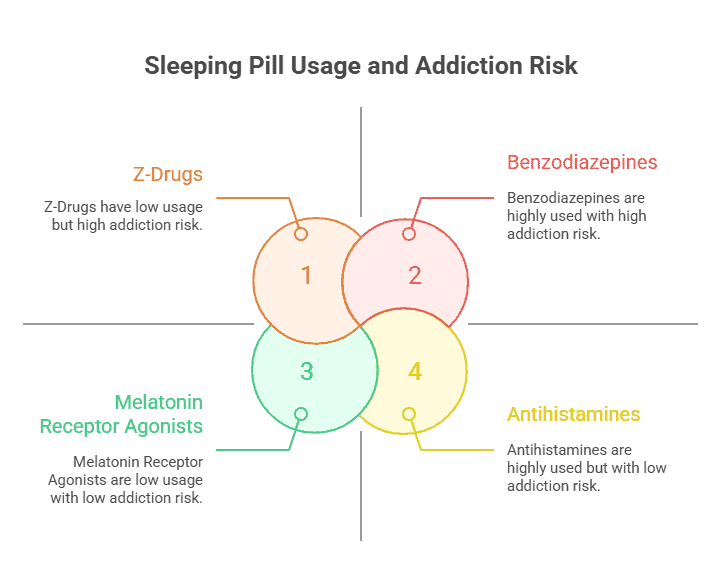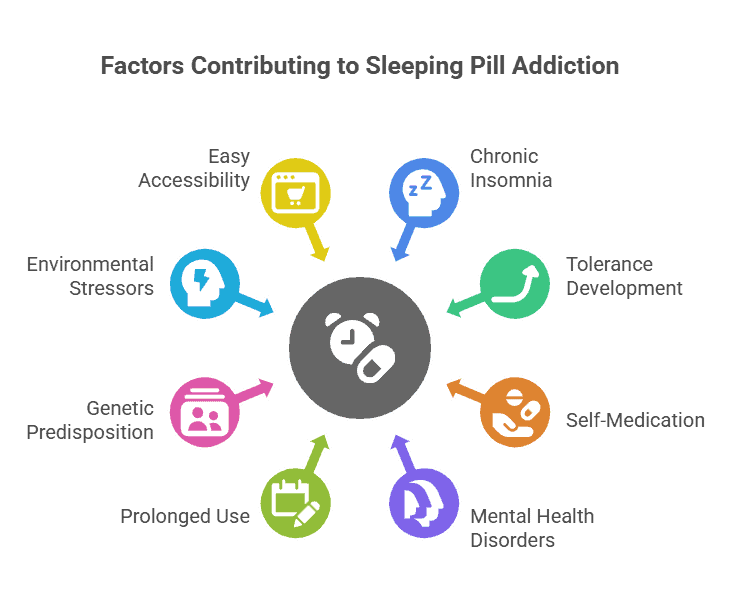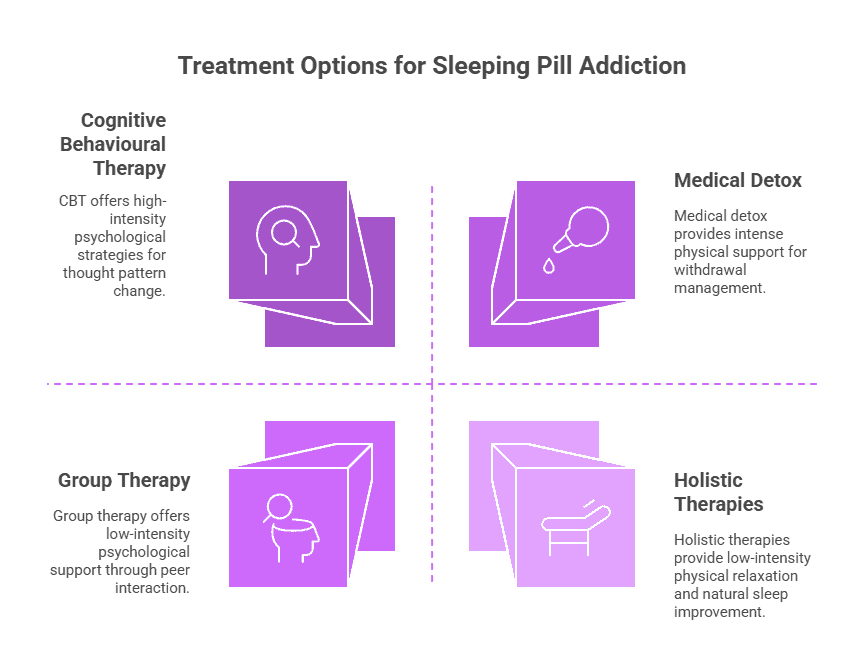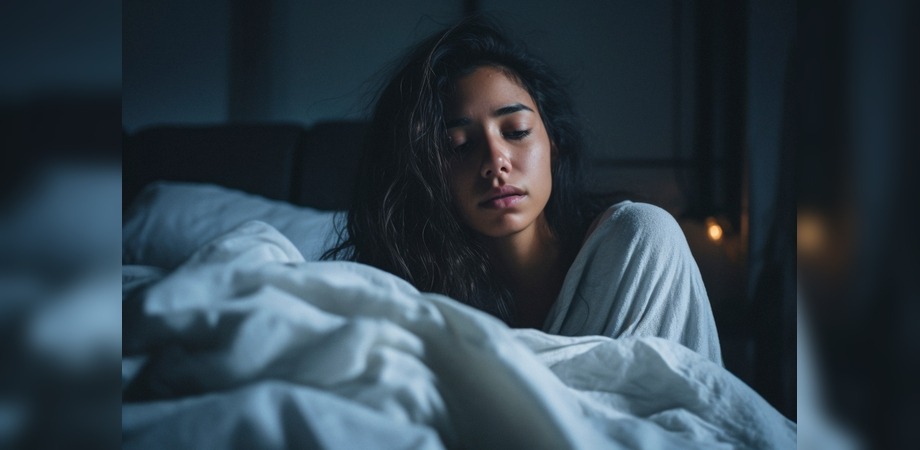Sleeping pill addiction is a dependency condition marked by compulsive use of sedative medications. The National Institute of Social Defence (NISD) in India reports that about 1.08% (1.18 crore people) are current users of sedatives for non-medical purposes, including sleeping pills.
Symptoms of sleeping pill addiction highlight warning signs such as tolerance, withdrawal, and cravings.
Causes of sleeping addiction point to underlying factors like insomnia, prolonged prescription use, and self-medication.
The effects of sleeping pill addiction extend beyond poor sleep quality, contributing to memory problems, impaired coordination, liver strain, and heightened risk of accidents.
Different treatment options for sleeping pill addiction include de-addiction programs like medical detoxification, behavioural therapies, and holistic recovery approaches that restore healthy sleep patterns.
Recovery from sleeping pill addiction requires long-term strategies such as relapse prevention, support groups, and lifestyle changes that promote natural rest without chemical reliance.
What Are Sleeping Pills?
Sleeping pills are medications that help people fall asleep or stay asleep by slowing brain activity and promoting relaxation. They are benzodiazepines, non-benzodiazepine hypnotics (Z-drugs), melatonin receptor agonists, and some antihistamines.
According to a 2018 Rapid Assessment Survey of Drug Abuse in India by UNODC, sedatives and tranquillisers (which include sleeping pills like nitrazepam and alprazolam) were the primary drugs of abuse for nearly 30% of respondents in Hyderabad.

What Is Sleeping Pill Addiction?
Sleeping pill addiction is a condition where a person develops a physical or psychological dependence on medications used for sleep, such as benzodiazepines, Z-drugs, or sedative antihistamines. It happens when the body becomes tolerant, requiring higher doses to achieve the same effect, and when stopping the drug causes withdrawal symptoms. Prolonged, this reliance interferes with daily functioning, decision-making, and overall health, turning a short-term sleep aid into a long-term, harmful habit.
About 8.5% of adults worldwide use sleep medications daily, with higher rates among older adults. Common drugs include benzodiazepines (e.g., diazepam, alprazolam) and non-benzodiazepine Z-drugs (e.g., zolpidem), both carrying risks of dependence and addiction, as noted by Ma et al. 2023 in “Global Trends in the Consumption of Benzodiazepines and Z-Drugs in 67 Countries and Regions From 2008 to 2018: A Sales Data Analysis.”
What Are the Symptoms of Sleeping Pill Addiction?
The common symptoms of sleeping pill addiction are physical, psychological, and behavioural changes that signal dependency, and are discussed below:
- Tolerance: Tolerance is when higher doses of sleeping pills are required over time to achieve the same sedative effect.
- Withdrawal Symptoms: Withdrawal symptoms are unpleasant effects like anxiety, irritability, nausea, and rebound insomnia that occur when the drug is reduced or stopped.
- Cravings: Cravings are intense urges to take the medication, even when not medically necessary.
- Memory Problems: Memory problems are difficulties with short-term recall and concentration caused by prolonged use.
- Daytime Drowsiness: Daytime drowsiness is persistent fatigue or sluggishness during waking hours.
- Doctor Shopping: Doctor shopping is visiting multiple healthcare providers to obtain extra prescriptions.
- Neglect of Responsibilities: Neglect of responsibilities is the inability to maintain work, family, or social duties due to dependence on the medication.
- Mood Changes: Mood changes are sudden emotional shifts, including depression, agitation, or irritability.
What Are the Withdrawal Symptoms of Sleeping Pill Addiction?
The withdrawal symptoms of sleeping pill addiction are uncomfortable physical and psychological effects that appear when reducing or stopping use, and are explained below:
- Rebound Insomnia: Rebound insomnia is the sudden worsening of sleep difficulties after discontinuing the drug.
- Anxiety: Anxiety is excessive nervousness, restlessness, or a sense of dread caused by withdrawal.
- Irritability: Irritability is heightened sensitivity, frustration, or mood swings during the withdrawal phase.
- Tremors: Tremors are involuntary shaking of the hands or body as the nervous system readjusts.
- Sweating: Sweating is increased perspiration without physical exertion, linked to stress withdrawal on the body.
- Nausea and Vomiting: Nausea is a queasy stomach sensation, while vomiting is the forceful expulsion of stomach contents, both common in withdrawal.
- Headaches: Headaches are persistent or intense head pain caused by a chemical imbalance during detox.
- Confusion: Confusion is disorientation or difficulty thinking clearly after stopping the drug.
- Seizures: Seizures are sudden, uncontrolled electrical disturbances in the brain, a severe withdrawal risk, especially with benzodiazepine-based pills.
What Causes Sleeping Pill Addiction?
The causes of sleeping pill addiction are biological, psychological, and environmental factors that contribute to dependence, and are outlined below:
- Chronic Insomnia: Chronic insomnia is persistent difficulty falling or staying asleep, leading individuals to rely heavily on medication for rest.
- Tolerance Development: Tolerance development is when the body adapts to the drug, requiring higher doses to achieve the same sedative effect.
- Self-Medication: Self-medication is the misuse of sleeping pills to cope with stress, anxiety, or emotional distress beyond prescribed use.
- Underlying Mental Health Disorders: Underlying mental health disorders are conditions like depression or generalised anxiety that increase the likelihood of misuse.
- Prolonged Prescription Use: Protracted prescription use is long-term reliance on benzodiazepines or Z-drugs beyond recommended durations.
- Genetic Predisposition: Genetic predisposition is an inherited susceptibility to substance dependence due to a family history of addiction.
- Environmental Stressors: Environmental stressors are life challenges such as work pressure, trauma, or personal loss that push individuals toward excessive use.
- Easy Accessibility: Sleeping pills are easily accessible through repeated prescriptions or online purchases without strict regulation.

What Are the Side Effects of Sleeping Pill Addiction?
The side effects of sleeping pill addiction are physical, cognitive, and behavioural consequences that worsen with prolonged misuse, and are detailed below:
- Daytime Drowsiness: Daytime drowsiness is excessive tiredness during waking hours, lowering alertness and productivity.
- Memory Impairment: Memory impairment is difficulty recalling recent events or forming new memories due to sedative effects on brain function.
- Cognitive Slowing: Cognitive slowing is delayed thinking, poor concentration, and reduced problem-solving abilities.
- Mood Changes: Mood changes are emotional shifts such as irritability, anxiety, or depression triggered by drug dependence.
- Poor Motor Coordination: Poor motor coordination is unsteady movement or impaired balance, raising the risk of accidents and falls.
- Respiratory Depression: Respiratory depression is slowed or shallow breathing, particularly dangerous at high doses or with alcohol use.
- Digestive Issues: Digestive issues are nausea, vomiting, or constipation brought about by continued drug exposure.
- Rebound Insomnia: Rebound insomnia is worsened sleeplessness when attempting to stop or minimise medication use.
- Physical Dependence: Physical dependence is the body’s reliance on the drug, sparking withdrawal symptoms when not taken.
What Are Treatment Options for Sleeping Pill Addiction?
The treatment options for sleeping pill addiction are structured approaches that address both physical dependence and psychological reliance, and are as follows:
- Medical Detox: Medical detox is the supervised withdrawal process where doctors manage symptoms safely, using tapering schedules or alternative medications.
- Inpatient Rehabilitation: Inpatient rehabilitation is a residential program that provides 24/7 medical and therapeutic support to stabilise patients and help them establish new routines.
- Outpatient Rehabilitation: Outpatient rehabilitation is a flexible program where individuals attend scheduled therapy and medical check-ins while living at home.
- Cognitive Behavioural Therapy (CBT): Cognitive Behavioural Therapy is a structured psychological treatment that helps individuals identify negative thought patterns and replace them with healthier coping strategies.
- Group Therapy: Group therapy is a peer-based approach where individuals share experiences, gain support, and build accountability in recovery.
- Medication-Assisted Treatment (MAT): Medication-Assisted Treatment is the use of non-addictive medications to ease withdrawal symptoms and curb cravings.
- Holistic Therapies: Holistic therapies are complementary practices such as meditation, yoga, and mindfulness that support relaxation and improve sleep naturally.
- Aftercare Programs: Aftercare programs are ongoing support services to maintain long-term sobriety, including counselling, relapse prevention planning, and 12-step meetings.
Treatment plans are individualised, blending pharmacological and psychotherapeutic approaches.

What Does Recovery from Sleeping Pill Addiction Involve?
Recovery from sleeping pill addiction involves detox to manage withdrawal, followed by therapy to address underlying issues and build healthier coping skills. Cognitive Behavioural Therapy (CBT), group support, and holistic methods such as mindfulness and lifestyle changes restore natural sleep patterns. Ongoing aftercare, incorporating de-addiction programs and relapse prevention strategies, maintains long-term sobriety.
Can Sleeping Pill Addiction Develop from Prescribed Use?
Yes, sleeping pill addiction can emerge even from prescribed use when dosage exceeds medical guidance or duration extends beyond short-term recommendations.
What Are the Effects of Insomnia?
The effects of insomnia are impaired cognitive function, mood disturbances, and increased risk of chronic health conditions such as cardiovascular disease and diabetes. About 33% of Indians have insomnia, as published by Anjanappa J. & Mehta K. 2025, in their paper, “Management of Insomnia in India: Expert Consensus Insights with a Focus on Zolpidem.” Zolpidem is presently the preferred first-line pharmacotherapy for insomnia treatment in India, attributed to its efficacy and lower risk profile in comparison to benzodiazepines.
How Long Does Recovery from Sleeping Pill Addiction Take?
Recovery timelines vary; mild cases stabilize in weeks, while severe addictions require months to years of continuous care.
Are Sleeping Pills Dangerous When Mixed with Alcohol?
Yes, sleeping pills are dangerous when mixed with alcohol because they amplify sedation, intensifying the risk of respiratory depression, overdose, and fatality. Indian studies spotlight notable polysubstance abuse involving alcohol and benzodiazepines. Research on alprazolam misuse shows prevalence rates between 3% and 20% across different groups, with frequent co-use of alcohol, opioids, and cannabis, raising risks of addiction, cognitive decline, and healthcare strain, as explored by Juvvadi et al. 2023 in “Is Alprazolam A Potential Drug Of Abuse In India’s Near Future?”





